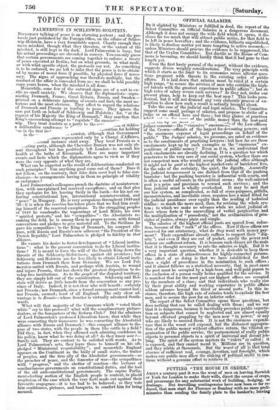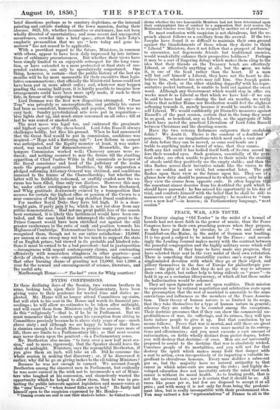PUTTING "THE HOUSE IN ORDER."
AB017T a century past it was the wont of men on leaving Berwick or York for London to make their wills, direct the course of crops, Lind prearrange for any substantial work of building, hedging, or drainage. But travelling contingencies have now been so far re- duced, that men start for Florence or Bombay with no more preli- minaries than sending the family plate to the banker's ; leaving
brief directions perhaps as to sanatory depletions, or the internal painting and outside washing of the town mansion, during their absence. Still, life, whether locomotive or stationary, has not been wholly divested of uncertainties ; and some recent and unexpected occurrences, crowded into a brief space, attest that 'Uncle Toby's emphatic premonition that we are "here today and gone to- morrow" has not ceased to be applicable. With a provident regard to the future, Ministers, in common with others, appear to have been duly impressed by late intima- tions of sublunary precariousness. But whether their views have been simply limited to an enjoyable retrospect for the long vaca- tion, or have extended to a more protracted or final state of sus- pended existence, can only be speculatively conjectured. One thing, however, is certain—that the public history of the last six months will be far more memorable for their executive than legis- lative consummations ; that officially the Ministerial house could not have been put in more adroit order ; and, whatever may happen pending the ensuing half-vear, it is hardly possible to imagine how arrangements could' have -been more aptly made, if such be their fate, in favour of the outgoing tenants.
Lord Denman was the first new disposition attempted. "Poor Tom" was privately so unexceptionable, and publicly his career had been so consistent, honourable, and popular, that this was no easy task. Sundry pyrotechnical arts were put in requisition— blue lights shot up, and much straw consumed on all sides ; till at last he was scared or smoked out.
The next move was legal too, and embraced the proximate and highest square of the chess-board. Lord John Russell always challenges boldly, but flies his ground. When he had announced that the Great Seal would be lint in commission confidence was inspired—" Hope told a flattering tale " : Law Reform in earnest was anticipated, and the Equity monster at least, it was under- stood, was marked for dismemberment. Meanwhile, the pro- tenapore Commission worked well ; Chancery arrears were re- duced; and nothing occurred to mar the future till the startling apparition of Chief Justice Wilde in full canonicals as keeper of the Royal conscience and head of the judiciary of the realm made the prospect equivocal. Doubtles, by this conjuration a pledged reforming Attorney-General was obtained, and conditions annexed to the tenure of the Chancellorship ; but whether the latter will be faithfully redeemed, or craftily evaded now the va- cuum has been filled, time only can disclose. However this may be, under either contingency an obligation has been discharged, and Whig gratitude dexterously evinced by a transposition that secures for certain the highest office or pension of the Crown to a nbar connexion of their late and long steadfast Ducal confederate.
For another Royal Duke they have bid high. It is a dear- bought gain, if party gain it be, which is not yet clear from any public demonstration. }Tad not one great public loss of the season been sustained, it is likely this lavishment would have been cur- tailed, and the same hand that intercepted the ultra grant to the Prince Consort would have been stretched out against the still greater exuberance in the ratio of rank and position towards his Highness of Cambridge. Extenuations have been pleaded—we have recognized them, though not to our entire satisfaction : 12,000/. per annum at one swoop may not be too much to support the state of an English prince, but viewed in its probable and kindred rela- tions it must be owned to be a bad precedent—bad in juxtaposition —incongruous with urgent contemporary claims, and contrasting offensively with remorseless stinginess in other quarters—poor devils of clerks, to wit—emigration outfit tings for indigence--and that other burning shame of granting not 12,000/. but 1,2001. year for the reward and encouragement of science, literature, and the useful arts.
Marlborough House—" Too bad" even for Whig courtiers !



























 Previous page
Previous page